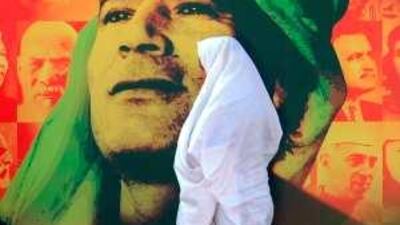TRIPOLI // Forty years ago today, the tanks and soldiers of the Libyan army converged on the Libyan capital, and in a twinkling the government of King Idris was replaced with that of Muammar Qadafi. Today, Tripoli is throwing the biggest party in its history to mark the anniversary. The city is covered in green flags and posters of a beaming Mr Qadafi - 40 years older but as brash as ever. Today, Libya is re-engaging with western countries and using its oil wealth to rebuild from crushing economic sanctions. But amid the changes, the constant remains Mr Qadafi, larger than life and firmly in charge. This has been good for the Libyan leader, who in January was elected to head the African Union. This month he will address the United Nations, where a Libyan diplomat will preside at the general assembly. Two weeks ago, Scottish judicial authorities released Abdel Baset al Megrahi, a former Libyan intelligence officer convicted of the 1988 Lockerbie bombing, in a move widely seen as a victory for the Libyan leader. Mr Qadafi came to power with the 1969 overthrowing of Libya's pro-Western monarchy and set up a state with himself as "Brotherly Guide and Leader of the Revolution". Libya was reorganised as a jamahiriya, or "state of the masses", a name coined by Mr Qadafi to denote a blend of socialism and Islam. For decades Libya backed assorted militant groups and liberation movements. That exasperated western countries such as the US and UK, both of which cut ties with Libya in the 1980s. By the mid-1990s, the country was staggering under international sanctions. In 1999 Libya delivered al Megrahi and a fellow suspect to stand trial for the Lockerbie bombing before a Scottish court convened in the Netherlands, began secret talks with the United States and repaired ties with Britain. Rapprochement has seen Libya pay US$2.7 billion (Dh9.9bn) to the families of victims of the Lockerbie bombing and renounce attempts to acquire nuclear weapons. Sanctions have been lifted and the US and British embassies have reopened in Tripoli. Libya, meanwhile, is open for business. It hopes to use oil to kick-start its economy and spruce up infrastructure. "Under the embargo, our lives were really miserable," said Mustafa Fetouri, a political analyst and professor of business management at Tripoli's Academy of Graduate Studies. "Today, even psychologically, people are more relaxed." Skyscrapers are rising over the Tripoli skyline and chic new boutiques are tucked beneath the arcades of old Italian colonial buildings like slabs of wedding cake. But farther afield, pavements are cracked and the dust rises from ramshackle working-class neighbourhoods. "God gave us oil and the West technology," said Saleh Mohamed, an official from Watasimu, a charity headed by Mr Qadafi's daughter, Aisha. "We're trying to improve the country now, but we need help." Libya's oil reserves and a foreign investment fund of more than US$60 billion are giving the country unprecedented bargaining power with European neighbours and attracting foreign firms and workers. "A lot of people try to go to Spain or Italy, but I saw there was no possibility for me to do this," said Bemba, 24, a Ghanaian construction worker who queued on Sunday afternoon outside a Moneygram office in Tripoli to send remittances home. "I decided that Libya was the right place for me." Around the corner, Green Square, Tripoli's central plaza, was being cleared for tonight's celebrations. A stage shaped like a Bedouin tent, a favourite Qadafi trademark, was set up to accommodate music groups from around the world. On Monday, a special African Union summit was held in a white pavilion by the Mediterranean. Posters around town feature Africa, a continent Mr Qadafi hopes to unite under a single government. Many others show Mr Qadafi himself. The Libyan leader will remain centre-stage. While he has proposed shrinking the government, and a committee spearheaded by his son, Saif al-Islam, has studied options for rewriting the constitution, neither initiative is likely to lead to major reform, analysts said. "The idea is not to change things overnight, but to phase out ministries such as health and education over a few years and establish independent entities instead," said Prof Fetouri, who has served as a consultant to a committee studying ways to restructure government. "If you don't see reform in the political system, change in the economy is going to be slow," said Ronald Bruce St John, a Libya expert and analyst for Foreign Policy in Focus, a think tank that is part of the Washington-based Institute for Policy Studies. The challenge for the government lies in the fact that "for all the money in their coffers, they have not yet found a way of translating that into better lives for citizens", said John Hamilton, a contributing editor for Africa Energy magazine. Finding a way to do so sounds good to Imad, 26, a gym manager who watched the preparations at Green Square on Sunday evening from the arcade outside a cafe. "I think that from here on the government should concentrate on improving the economy," he said. "I don't want to change the basic system, but I like the idea of giving more power directly to the people. He paused, looking at the activities going on in the square, and said: "Anyway, when a constitution has been around for 40 years, it's hard to change it." jthorne@thenational.ae

Libya marks 40 years of Muammar Qadafi's rule
Re-engagement with the West has given boost to army colonel who staged a coup in 1969 and has retained control ever since.
Most popular today
